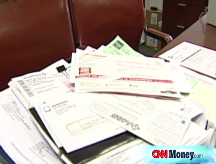600,000 jobs lost - and counting
Freeze in credit would only worsen unemployment as economic slowdown intensifies.
NEW YORK (CNNMoney.com) -- Job losses have been mounting, and the slowing economy and credit crunch is likely to take an even greater toll in the coming months.
Analysts on average forecast that the monthly employment report expected Friday will reveal that the economy shed 105,000 jobs in September - the largest monthly loss in five years. The economy already has lost 605,000 jobs this year.
Unemployment is expected to remain at a relatively high 6.1%.
What's more troubling is that hiring trends have deteriorated even further in recent weeks - and that won't be reflected in government statistics until later this year.
Failing mortgages and struggling banks have made it difficult for businesses and consumers alike to borrow money. If businesses can't borrow money, the thinking goes, they can't expand stores or hire more people.
"A complete lockup of the credit markets will reverberate throughout the economy in a very severe fashion," said Martin Regalia, chief economist at the U.S. Chamber of Commerce, a business lobby group. "If the economy weakens further, we'll see truly dramatic unemployment."
Regalia expects unemployment to reach 6.5% by the end of the first quarter next year, and 7% if nothing is done by the government to free up the capital markets. While the economy may stop shedding jobs at that point, he said those stubbornly high rates of unemployment could persist until the end of 2009.
Actual job losses are more difficult to predict. Regalia said 150,000 to 175,000 a month could be likely, significantly higher than today's levels but far below the rate of 250,000 to 300,000 lost during the last recession in 2002.
The government is still negotiating a package that would enable the purchase of distressed assets from banks in the hopes of getting them to lend again. The $700 billion bailout was rejected in the House of Representatives on Monday, and the Senate is going to vote on a revised version on Wednesday night.
"If we don't have measures to correct the situation, we will see more [job] losses," said Joyce Bastoli, a vice president at Ajilon Finance Solutions, part of the staffing company Adecco. "If companies don't have access to capital, we will see it trickle down."
Still, while there were some encouraging signs that the credit crisis is not having as devastating an impact as some fear, the slowing economy looms large.
"We're not seeing anything besides the normal tightening of credit you usually get at the end of an expansion," said Bill Dunkelberg, chief economist for the National Association of Independent Businesses.
Alan Tonelson, a research fellow at the U.S. Business and Industry Council, which represents smaller and mid-size manufacturers, said that most manufacturers are conservatively managed and have fairly low levels of debt. Tonelson is urging caution on any government bailout, saying banks should not be encouraged to resume their free-lending ways to consumers already overburdened with debt.
Even if businesses aren't yet impacted by the credit crunch, they are certainly planning for slowing sales as credit to consumers dries up. That could mean fewer orders for goods - and fewer people needed to manufacture, ship, stock and sell those goods.
"It's reasonable to expect not only job losses, but wage losses as well," said Tonelson.
Said Daniel Penrod, an industry analyst with the California Credit Union League, a trade association for credit unions: "We haven't really seen small businesses getting hurt because of access to money, but rather just because of the slowdown."
With the holiday shopping season just around the corner, the next sector ripe for a hit is retail, said John Challenger, chief executive of global outplacement firm Challenger, Gray & Christmas. A survey by Challenger released Wednesday said that the number of job cuts in September rose 7.2% to 95,094.
"Consumers are tapped, it's going to be a tough year," said Challenger. "Unemployment is going up by leaps and bounds." ![]()


